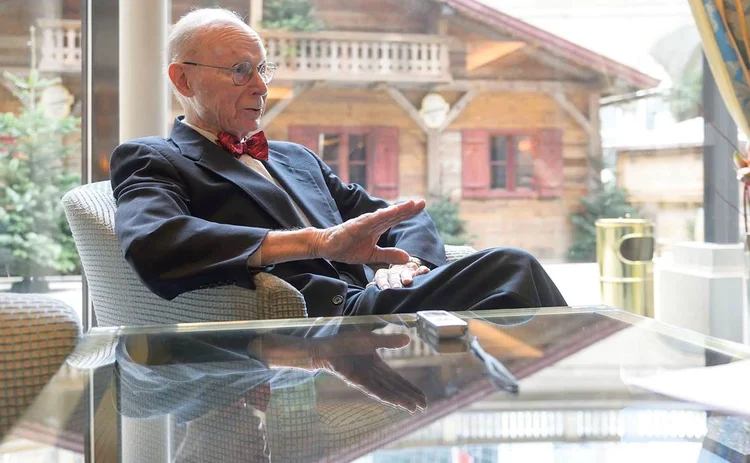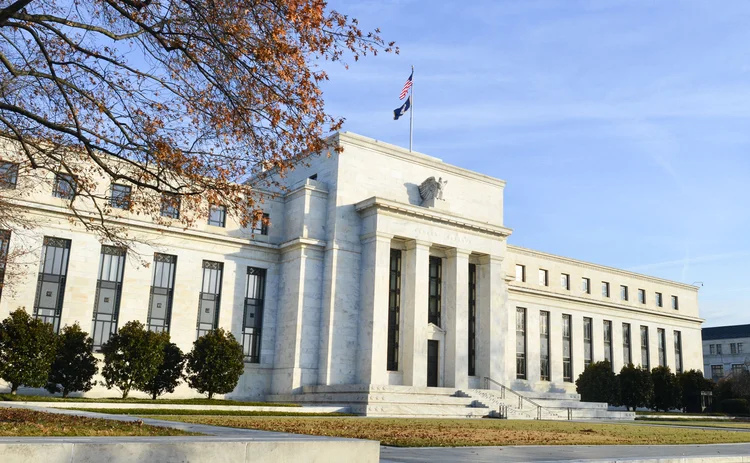
“What would Allan say?”
Central Banking Publications founder Robert Pringle finds pearls of wisdom in his email correspondence with the late Allan Meltzer

Allan Meltzer was a mentor and friend for more than 40 years. We met in 1974, when I was editing The Banker, and angrily trying to draw attention to the link between monetary growth and inflation – a link denied by the Bank of England (BoE), UK Treasury, all politicians except Keith Joseph and many commentators. Allan and Karl Brunner, a fellow monetarist, invited me to participate in a new venture, the Interlaken Seminar on Analysis and Ideology – an early effort to apply individualistic, economic reasoning to broad sociological and political issues. The mornings were spent discussing academic papers and the afternoons walking in the Alps – the best format for a week-long seminar ever developed! I attended several of these annual get-togethers in the 1970s, and we kept in touch subsequently. Allan was a strong supporter of Central Banking Publications from the start and a natural choice to be a founder member of our editorial advisory board. I believe he was pleased with the way it has developed. “It’s where I go to learn about the people and the policies” of the central banking world, he said.
Apart from the formal interviews that he gave to Central Banking and numerous contributed articles, he and I also kept up a lively private email correspondence. I would often bounce ideas off him. He would invariably respond. The following is a selection of our exchanges. It covers, among other topics, the markets, the US Federal Reserve Board, central bank independence, money and banking.
Frontrunning the central banks?
June–July 2012
Dear Allan
Reading your recent (co-authored) article in the Wall Street Journal, I was struck by this sentence: “Traders speculate whether and when the Fed will intervene next. The Fed can intervene without limit in any credit market – not only mortgage-backed securities, but also securities backed by automobile loans or student loans.”
I have often wondered about this aspect of QE [quantitative easing] – the same applies in the UK also, though here the BoE only buys gilts. It seems a charter for insiders to make money. Insiders must be able to guess with reasonable accuracy which specific stocks and what maturities the Fed and its agents will buy next, and the timing – and then with leverage can convert the following price rises into large profits.
Are you aware of any studies that have been done on that?
It seems to me that should be a topic for investigative journalism – perhaps you could suggest it to the Wall Street Journal? I don’t have the resources to do it for the UK, and the central banks would hate it. Of course, the market-makers involved – primary dealers, the Fed’s trusted circle of brokers – will keep their lips tight (unlike the idiots at the banks who wrote emails about manipulation of Libor!).
Robert

Dear Robert
Good suggestion. Often, the traders try to lead the Fed. It is a potential scandal. So, too, the policy of lending to the banks at a near-zero rate and allowing them to profit by holding longer-term debt. The banks’ profits pay for increased capital, bonuses, and dividends. Congress seems oblivious. The most important problem, in my judgment, is the unrestricted ability to print money. In a republic or democracy, no-one and no group should have so much unconstrained power. I believe the problem is as alive in the UK as it is here.
Allan
Dear Allan
How can that power be limited? Isn’t it the basic problem of fiat money?
You remind me of [Milton] Friedman’s wise comment, quoted in a recent article by Gerald O’Driscoll that I have been reading: “It may be that these mistakes were excusable on the basis of the knowledge available to men at the time – though I happen to think not. But that is really bedside the point. Any system which gives so much power and so much discretion to a few men that mistakes – excusable or not – can have such far-reaching effects is a bad system. It is a bad system to believers in freedom just because it gives a few men such power without an effective check by the body politic – this is the key political argument against an ‘independent’ central bank.”
Robert

Dear Robert
The best we can do is to adopt a rule that the Fed either follows or offers an explanation for deviations and submits resignations. That closes much of the gap between authority and accepting responsibility. I proposed that in New Zealand in 1985. They improved on it by adding an inflation target negotiated with the finance minister (treasurer in NZ). It won’t be perfect. Nothing is in an uncertain world. It will be better. Certainly it is better than allowing central bankers unrestricted authority to expand or contract without any restriction.
Inflation targets and responsibility have spread. I know. No central banker has been asked or told to resign. Not perfect, but as Milton often said: “The best is the enemy of the good.”
Allan
Dear Allan
Sorry for asking a very old, elementary question, but should the rule apply to the monetary base or to broader money? I say to the monetary base, as the central bank can control that, but we won’t get many people to agree with that position right now.
Robert
Dear Robert
Karl and I favored the monetary base for the reason you gave. But the choice seems to me to be of secondary importance. First importance is to get a binding rule.
Allan
Monetary policy and exchange rate stability
March 2013
Dear Allan
On exit strategy for the Fed, I have read your testimony [to Congress] and article on Europe; given the situation, what would you do to exit [from QE]? I would gradually raise rates starting now, but with international co-ordination. I think business would respond to a sign that leaders were trying to co-ordinate policies to achieve international monetary stability. Of course, they also need to reduce regulation, etc.
Robert
Dear Robert
I would be gradual, also. Most important, I would announce a long-term policy and follow it as best I can. If necessary, I would create a lockbox and put in more than $1 trillion of mortgage-backed securities and equivalent reserves. I would announce that the lockbox is closed for 10 years. If needed, that would make the adjustment a bit easier.
I would, at the same time, try to get international agreement on a common low-inflation target. We need to remember that monetary policy must be integrated to get both low inflation and less exchange rate variability. Of course, changes in real exchange rates would continue. You are one of the lonely few who want both low inflation and less exchange rate variability.
Allan
Dear Allan
Thanks so much, I really appreciate your clarification and comments. I am stuck on two points:
- What is a lockbox? Does it mean you don’t make any payments in or out?
- I also want to make sure I understand what you mean [by] “monetary policy must be integrated” – do you mean internationally integrated?
Robert
Dear Robert
Right on both. The lockbox removes a sizeable part of the Fed’s balance sheet from overhanging the market. As its name suggests, the mortgage-backed [securities] and reserves cannot be reduced, so they do not affect market expectations for 10 years.
Most discussions of monetary policy neglect that more stable exchange rates are desirable as well as low or zero inflation. I want a system that does not depend on repeated political agreement
Allan Meltzer, 2013
Most discussions of monetary policy neglect that more stable exchange rates are desirable as well as low or zero inflation. I want a system that does not depend on repeated political agreement. So, like the old gold standard, let most countries choose whether to peg or float, and rely on market enforcement to maintain inflation in the central countries at 2% maximum. They float.
Perfect? Of course not. Better? Yes. Real exchange rates for the central countries would respond to real changes. That is a part of the adjustment to productivity and taste differences. If real changes are large, as I believe, exchange rate changes will be a source of fluctuations. But we should learn from the gold standard that a monetary rule restricts fiscal activism.
From 1787 to 1930, the US ran a budget surplus in two-thirds of all non-war years.
Allan
Dear Allan
Thank you. What are the reasons that have led you to believe stable exchange rates are desirable? I always thought you were a free floater! Perhaps you see it as a reinforcement for monetary rules at the national level.
I feel inflation targeting has let us down so badly it is tainted beyond repair. Hence the search for alternative anchors – which clearly should be international.
Robert
Dear Robert
I favored floating as the only way to respond to independent fiscal policies. As we can see from the euro and many other experiences, destabilizing fiscal policies and anticipations of further fiscal shocks augmented exchange rate changes. I also could see that Hong Kong avoided fiscal deficits, so the peg to the dollar worked for them. More important is the lesson from US history. From 1797 to 1930, the US had a budget SURPLUS in two-thirds of non-war years. That kept the dollar exchange rate at a fixed gold price for more than 100 years.
So, [in] about 1985, I first proposed common inflation rates of 2% or less in the major countries. They float. But they provide a relatively stable inflation rate for any country that chooses to peg. So we get some of the external benefit of price stability and exchange rate stability. And the major countries get some greater exchange rate stability and stable inflation.
The lessons of the monetary history of the past 60 years [are] that stability is not possible if countries run large budget deficits.
I think the talk about alternatives to inflation targeting is misguided to the point of being blind. No alternative will work better if there is no restriction on budget deficits. I have common inflation targets AND market discipline. Big deficits will cause depreciation of a currency. The gold standard worked as well as it did relying on market discipline to force fiscal discipline.
Recall what happened to the dollar exchange rate when [US president Ronald] Reagan and [Fed chair Paul] Volcker signaled an end to US inflation. Compare that to the idiotic statement in Moscow that said competitive devaluation was OK if you say it is for domestic effect.
Allan
Dear Allan
I suppose it boils down to deciding which system or set of arrangements can discipline domestic, especially, as you say, fiscal, policies. This may depend on circumstances and beliefs…

If my reading of history is right, that is why John Locke insisted in the 1690s that gold and silver were money, and the public stamp merely attested to their purity, and the state could not alter their value – precisely to prevent the Treasury from moving to a pure credit currency. The idea that money was founded on natural law – immutable, like the laws of physics that Newton had recently explained – was intended to provide a check to the excesses of credit money, and government access to it. The UK Treasury’s acceptance of this position at the time and for the next 200 years is what is surprising.
Robert
On the dollar and loss of US influence
Dear Robert
Except for a few periods, the US has not cared to have the dollar as international currency. See my history. When [James] Tobin was a member of the Council [of Economic Advisers], he favored letting the dollar go. Friedman favored floating, [former US Treasury Secretary] George Shultz implemented this policy. [Then-president Richard] Nixon and [Fed chair Arthur] Burns didn’t care.
Nevertheless, US policy since 1965 (48 years) has mostly trashed the dollar. That has led to an oh-so-gradual drop in central bank dollar holdings, especially recently. It seems to me that the solution that the countries will wander into is a system of multiple reserves – dollars, gold and other currencies.
What [Fed chairman Ben] Bernanke has done is bail out the bankers and finance the Treasury
Allan Meltzer, 2013
I wrote a piece several years ago that the World Economics Journal published. It predicted the loss of US influence. The Chinese recently found it and republished it. I mentioned that US military strength had two major effects. It allowed other countries to free-ride and use resources to invest, increasing world growth. And it maintained stability in places like the Middle East. That permitted countries and companies to expand trade, send sales and production people to developing countries. That is ending. I expect that when GE or others offer you the management job in most Middle Eastern countries, you quickly look for another job.
What [Fed chairman Ben] Bernanke has done is bail out the bankers and finance the Treasury. The main reason the economy doesn’t respond to the huge increase in monetary stimulus is because our current problems are not mainly monetary problems. The larger problems burdening the US economy are real. Every beginning student of economics learns that monetary policy cannot improve real problems. Real problems require real changes.
Allan
Dear Allan
Just two comments:
- I am sure you are right in pointing to real, rather than monetary, obstacles. Isn’t one of these the fear of a renewed financial crash, asset collapse when rates return to a normal level? There is a feeling that – as I recall [BoE governor] Mervyn [King] put it in a speech – none of the underlying causes of the financial collapse has been removed/solved. If central bankers are saying that, it is natural for households, bankers and companies to sit on their cash.
- The main reason that I came to the reluctant conclusion that the banking model as such is broken is the collapse of ethical standards. Traditional banking ethics were not just an optional add-on, but essential. There is no prospect of them returning. When you give a banker your money, you can never know what he/she does with it. If they don’t care about their reputation, market discipline is toothless. Maybe I am wrong, but I do not see how regulation can ever be a substitute for it, not even with 50% capital.
Robert
Dear Robert
Yes, uncertainty about inflation, rates, etc, are real problems. Here we also have a very left-wing president [Barack Obama] who wants to regulate, tax and restore labor union power. Why invest much more than needed to keep operations going?

Re: ethics. I am more of an optimist. If we make bankers responsible for their decisions, we get market enforcement, as under the gold standard. Stock prices fall with excessively risky behavior, Managers lose income and jobs. They have an incentive to be responsible. Perfect? No. In Why Capitalism?, I am strongly on the side of [eighteenth century German philosopher Immanuel] Kant and the medieval church.1 Humans are imperfect. Rules can improve outcomes. But optimality is a never-never promise.
Allan
On the monetary base
April 2013
Dear Allan
Do you still feel we should target money, rather than inflation? If money, why not freeze the monetary base?
Robert
Dear Robert
I concluded some time ago that the market and policymakers found aggregates much more difficult to target than interest rates.
Allan
On Fed chair Janet Yellen
July 2014
Dear Allan
Any thoughts on Yellen’s latest testimony?
Robert
Dear Robert
She is repeating the usual Fed mistake of putting excessive attention to unemployment. Unemployment rates are down, but mainly because workers dropped out of the labor force. Most of the new jobs are part-time, but not because of monetary restriction. There are $2.6 trillion of excess reserves at banks and trillions of cash on company balance sheets. Firms are buying back shares at these inflated prices, instead of investing. Those are fiscal and regulatory problems plus weak world demand, not monetary.

Neglect, even dismissal, of data on money growth is one of the most costly results of the excessive focus on short-term data. Medium- and longer-term data on money growth have correctly forecast inflation repeatedly. The Fed not only ignores these data, it paid interest on reserves to discourage banks from creating money. The current Fed ignores money growth and treats the response to policy as entirely given by the movement of interest rates. This is a huge error that is without support in past experience.
Allan
The effects of Fed policies
Dear Robert
NB From one of my recent articles: “The chief beneficiaries of Fed policy gained from the rise in the stock markets. Speculators and short-term traders became a vociferous opponent of ending the very big increase in stock prices. What they fail to understand is that unlike the stock market the economy benefits from the rise in stock prices only if the rise in asset prices stimulates new investment. New investment occurs if investors see the lower price of new, current capital as a substitute for purchasing existing assets. This did not happen. Spending for new capital never increased in this recovery. Instead, companies bought existing assets, removing competitors. Fed monetary policy did get some production of new houses through this channel.”
Allan
On low rates and central banks
September 2016
I can’t figure out why markets are making it easier for governments to borrow, instead of disciplining them in the normal way by putting rates up
Robert Pringle, 2016
Dear Allan
I can’t figure out why markets are making it easier for governments to borrow, instead of disciplining them in the normal way by putting rates up. Putting it another way, why on this occasion do they believe governments (despite the temptation to borrow and spend more, as urged by so many pundits) will be extremely prudent and plan for the long-term debt retirement?
Robert
Dear Robert
The problem is to explain why real rates remain close to zero or below out to 30 or more years. Near term for the US, it is the anti-business, anti-market attitude of the Obama administration. In Japan, as governor [Haruhiko] Kuroda said at Jackson [Hole], it requires a government policy to improve labor market functioning, etc.
None of these explain why savvy investors buy 30-year German bonds at negative real yields. Markets have to believe we are going into another period of declining debt with real growth. We did that following the [American] Civil War and World War I. My main point is that it requires an increase in saving. Markets think there is a debt/GDP ceiling that will force debt reduction in the future. I don’t believe that, but I claim that we require that kind of an increase in saving over many years to get that result.
Allan
Dear Allan
The Bank for International Settlements has a monetary explanation: “While part of their decline in real terms surely reflects secular factors beyond policymakers’ control, part probably also reflects policymakers’ asymmetrical response, which can contribute to the build-up of financial imbalances and to their long-term costs for output and productivity. This raises the risk of a debt trap, whereby, as debt increases, it becomes harder to raise rates without causing damage. And it means that, over sufficiently long horizons, low interest rates become to some extent self-validating. Low rates in the past help shape the economic environment policymakers take as given when tomorrow becomes today. In this sense, low rates beget lower rates.”
What do you think of this?
Robert

Dear Robert
The rates are real rates for 30 or more years. There is no way for central banks to PERMANENTLY alter such rates. The central banks can affect nominal rates, not real rates, so they follow along, but do not cause and cannot change low real rates.
As I say in my paper: “As time passes and the population ages, promises for pensions and healthcare become actual budget spending. The effect is to push up future deficits and add to the problem by requiring more spending cuts and more tax increases… [Yet] real long-term interest rates are near zero throughout the developed world. That’s the market speaking about the future it sees. Because they are pessimistic about future income, members of the public willingly buy long-term debt at negative real interest rates to shift consumption to the future.”
Allan
On Brexit
September–October 2016
Robert
I’m waiting for the pro-European Union folks to recognize that the EU is a flawed institution. It lacks a means for relative price and production costs to adjust. That requires changes in unit labor costs. Two of its largest members, France and Italy, are unable politically to make the adjustment.
The result is stagnation. And that is precisely what has happened. Why should Britain tie itself close to a failing arrangement that only continues because no government wants to take the consequence of ending it or changing it?
And the price of membership is acceptance of regulations that the unelected Socialists in Brussels impose? So far, Britain has managed OK. I do not believe that the hard-headed Germans and Dutch will not find their way to keep the beneficial trade deals they negotiated. Surely you recognize that the pessimistic predictions of [hedge fund manager George] Soros and others were wrong. Even in the worst case, freedom is gained, and that is a very valuable gain.
Allan
I’m waiting for the pro-European Union folks to recognize that the EU is a flawed institution. It lacks a means for relative price and production costs to adjust. That requires changes in unit labor costs. Two of its largest members, France and Italy, are unable politically to make the adjustment
Allan Meltzer, 2016
Central bank independence
October 2016
Dear Robert
It is hard for a central banker to retain independence in bad times. Only strong ones like Volcker or [Otmar] Issing do it. I once asked Issing how often he had pressure from politicians while at the European Central Bank. “Daily” was the reply.
Allan
And on president Donald Trump
February 2017
And finally to my last email from him, which came on February 26, 2017 (he died in May). I had asked whether he still supported Trump. He replied that Trump was “far from attractive on several dimensions”. However, the “forecasts of disaster by people like Paul Krugman and Joseph Stiglitz” contrasted with the “positive appraisal” of the markets. “The left compares him to Hitler,” he noted, adding that this was “far-fetched and destructive”.
I hope a reader who has read the above selection will understand why, when thinking about a topic, I often ask myself: “Now, what would Allan say about it?”
Robert Pringle’s debates with Allan Meltzer on the international monetary system can be found by clicking here.
Further reading
Only users who have a paid subscription or are part of a corporate subscription are able to print or copy content.
To access these options, along with all other subscription benefits, please contact info@centralbanking.com or view our subscription options here: http://subscriptions.centralbanking.com/subscribe
You are currently unable to print this content. Please contact info@centralbanking.com to find out more.
You are currently unable to copy this content. Please contact info@centralbanking.com to find out more.
Copyright Infopro Digital Limited. All rights reserved.
As outlined in our terms and conditions, https://www.infopro-digital.com/terms-and-conditions/subscriptions/ (point 2.4), printing is limited to a single copy.
If you would like to purchase additional rights please email info@centralbanking.com
Copyright Infopro Digital Limited. All rights reserved.
You may share this content using our article tools. As outlined in our terms and conditions, https://www.infopro-digital.com/terms-and-conditions/subscriptions/ (clause 2.4), an Authorised User may only make one copy of the materials for their own personal use. You must also comply with the restrictions in clause 2.5.
If you would like to purchase additional rights please email info@centralbanking.com








